if的省略句3
- 格式:docx
- 大小:13.70 KB
- 文档页数:1
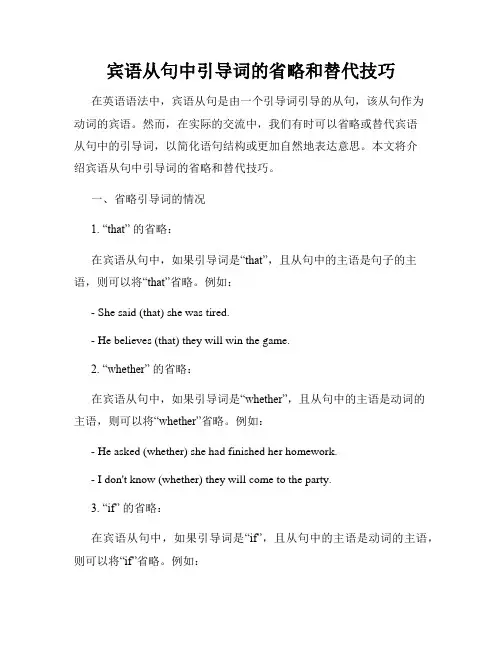
宾语从句中引导词的省略和替代技巧在英语语法中,宾语从句是由一个引导词引导的从句,该从句作为动词的宾语。
然而,在实际的交流中,我们有时可以省略或替代宾语从句中的引导词,以简化语句结构或更加自然地表达意思。
本文将介绍宾语从句中引导词的省略和替代技巧。
一、省略引导词的情况1. “that” 的省略:在宾语从句中,如果引导词是“that”,且从句中的主语是句子的主语,则可以将“that”省略。
例如:- She said (that) she was tired.- He believes (that) they will win the game.2. “whether” 的省略:在宾语从句中,如果引导词是“whether”,且从句中的主语是动词的主语,则可以将“whether”省略。
例如:- He asked (whether) she had finished her homework.- I don't know (whether) they will come to the party.3. “if” 的省略:在宾语从句中,如果引导词是“if”,且从句中的主语是动词的主语,则可以将“if”省略。
例如:- He wonders (if) she is happy.- I doubt (if) it will rain tomorrow.二、替代引导词的情况1. “that” 的替代:在宾语从句中,除了直接省略“that”之外,还可以使用一些代替词来引导宾语从句,例如“whether”和“if”。
例如:- She wonders whether she should go to the party.- He asked if she had seen the movie.2. “what” 的替代:当宾语从句中的内容具体表示某事物或事实时,可以用“what”来替代整个从句。
例如:- I don't know what time it is.(我不知道现在是几点。
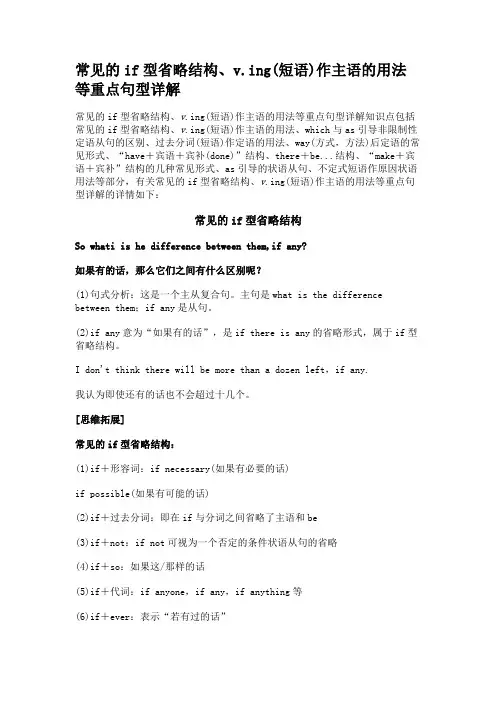
常见的if型省略结构、v.ing(短语)作主语的用法等重点句型详解常见的if型省略结构、v.ing(短语)作主语的用法等重点句型详解知识点包括常见的if型省略结构、v.ing(短语)作主语的用法、which与as引导非限制性定语从句的区别、过去分词(短语)作定语的用法、way(方式,方法)后定语的常见形式、“have+宾语+宾补(done)”结构、there+be...结构、“make+宾语+宾补”结构的几种常见形式、as引导的状语从句、不定式短语作原因状语用法等部分,有关常见的if型省略结构、v.ing(短语)作主语的用法等重点句型详解的详情如下:常见的if型省略结构So whati is he difference between them,if any?如果有的话,那么它们之间有什么区别呢?(1)句式分析:这是一个主从复合句。
主句是what is the difference between them;if any是从句。
(2)if any意为“如果有的话”,是if there is any的省略形式,属于if型省略结构。
I don't think there will be more than a dozen left,if any.我认为即使还有的话也不会超过十几个。
[思维拓展]常见的if型省略结构:(1)if+形容词:if necessary(如果有必要的话)if possible(如果有可能的话)(2)if+过去分词:即在if与分词之间省略了主语和be(3)if+not:if not可视为一个否定的条件状语从句的省略(4)if+so:如果这/那样的话(5)if+代词:if anyone,if any,if anything等(6)if+ever:表示“若有过的话”v.ing(短语)作主语的用法Getting to know a little bit about British history will help you solve this puzzle.了解一点英国历史将有助于你解决这个难题。
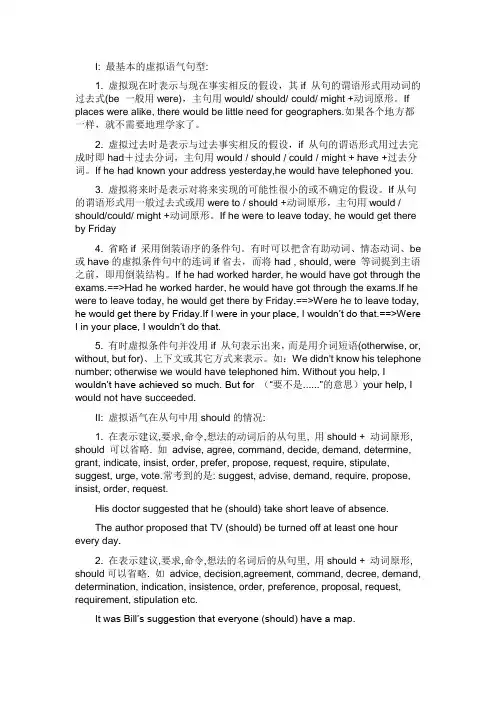
I: 最基本的虚拟语气句型:1. 虚拟现在时表示与现在事实相反的假设,其if 从句的谓语形式用动词的过去式(be 一般用were),主句用would/ should/ could/ might +动词原形。
If places were alike, there would be little need for geographers.如果各个地方都一样,就不需要地理学家了。
2. 虚拟过去时是表示与过去事实相反的假设,if 从句的谓语形式用过去完成时即had+过去分词,主句用would / should / could / might + have +过去分词。
If he had known your address yesterday,he would have telephoned you.3. 虚拟将来时是表示对将来实现的可能性很小的或不确定的假设。
If从句的谓语形式用一般过去式或用were to / should +动词原形,主句用would / should/could/ might +动词原形。
If he were to leave today, he would get there by Friday4. 省略if 采用倒装语序的条件句。
有时可以把含有助动词、情态动词、be 或have的虚拟条件句中的连词if省去,而将had , should, were 等词提到主语之前,即用倒装结构。
If he had worked harder, he would have got through the exams.==>Had he worked harder, he would have got through the exams.If he were to leave today, he would get there by Friday.==>Were he to leave today, he would get there by Friday.If I were in your place, I wouldn‟t do that.==>WereI in your place, I wouldn‟t do that.5. 有时虚拟条件句并没用if 从句表示出来,而是用介词短语(otherwise, or, without, but for)、上下文或其它方式来表示。
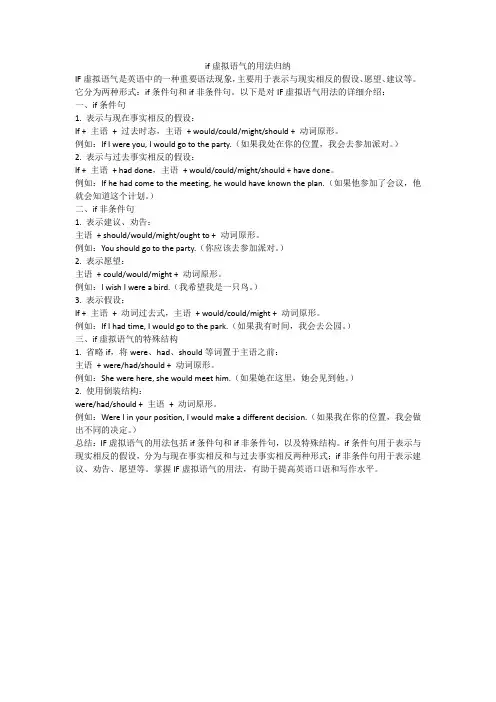
if虚拟语气的用法归纳IF虚拟语气是英语中的一种重要语法现象,主要用于表示与现实相反的假设、愿望、建议等。
它分为两种形式:if条件句和if非条件句。
以下是对IF虚拟语气用法的详细介绍:一、if条件句1. 表示与现在事实相反的假设:If + 主语+ 过去时态,主语+ would/could/might/should + 动词原形。
例如:If I were you, I would go to the party.(如果我处在你的位置,我会去参加派对。
)2. 表示与过去事实相反的假设:If + 主语+ had done,主语+ would/could/might/should + have done。
例如:If he had come to the meeting, he would have known the plan.(如果他参加了会议,他就会知道这个计划。
)二、if非条件句1. 表示建议、劝告:主语+ should/would/might/ought to + 动词原形。
例如:You should go to the party.(你应该去参加派对。
)2. 表示愿望:主语+ could/would/might + 动词原形。
例如:I wish I were a bird.(我希望我是一只鸟。
)3. 表示假设:If + 主语+ 动词过去式,主语+ would/could/might + 动词原形。
例如:If I had time, I would go to the park.(如果我有时间,我会去公园。
)三、if虚拟语气的特殊结构1. 省略if,将were、had、should等词置于主语之前:主语+ were/had/should + 动词原形。
例如:She were here, she would meet him.(如果她在这里,她会见到他。
)2. 使用倒装结构:were/had/should + 主语+ 动词原形。
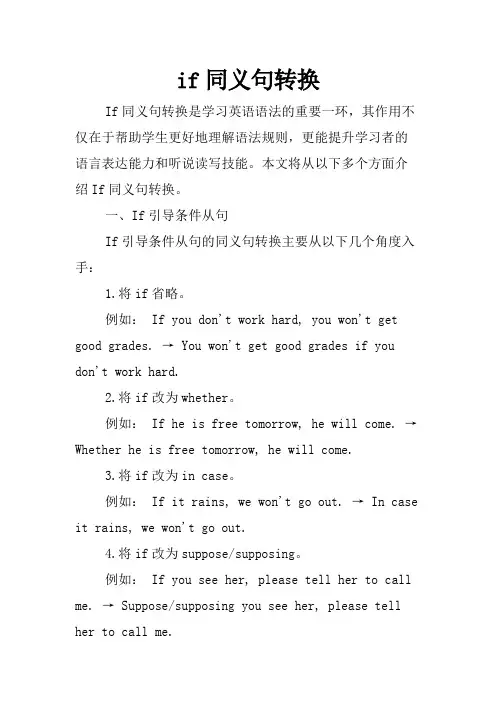
if同义句转换If同义句转换是学习英语语法的重要一环,其作用不仅在于帮助学生更好地理解语法规则,更能提升学习者的语言表达能力和听说读写技能。
本文将从以下多个方面介绍If同义句转换。
一、If引导条件从句If引导条件从句的同义句转换主要从以下几个角度入手:1.将if省略。
例如: If you don't work hard, you won't get good grades. → You won't get good grades if you don't work hard.2.将if改为whether。
例如:If he is free tomorrow, he will come. → Whether he is free tomorrow, he will come.3.将if改为in case。
例如:If it rains, we won't go out. → In case it rains, we won't go out.4.将if改为suppose/supposing。
例如: If you see her, please tell her to call me. → Suppose/supposing you see her, please tell her to call me.二、If引导虚拟语气If引导虚拟语气的同义句转换主要从以下几个角度入手:1.将If从句所用的动词的过去式形式去掉。
例如:If I were you, I would study hard. → Were I you, I would study hard.2.将if改为suppose/supposing或assuming(假设)。
例如: If I had a million dollars, I would travel around the world. → Supposing I had amillion dollars, I would travel around the world.或Assuming I had a million dollars, I would travel around the world.3.将if引导的虚拟语气改写成had+动词过去分词的形式。
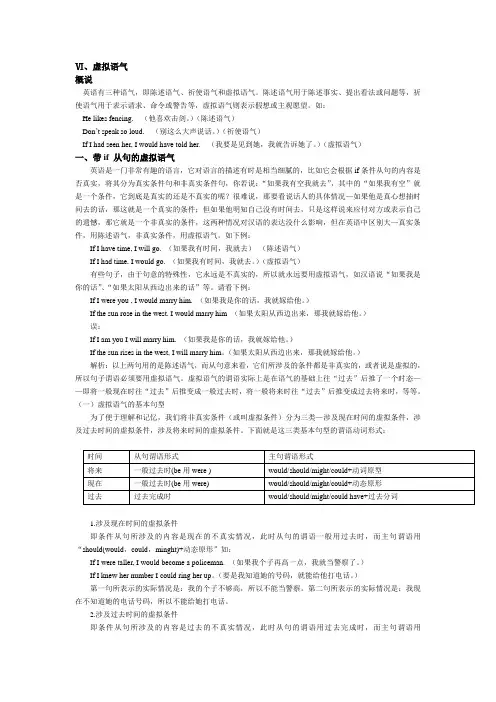
Ⅵ、虚拟语气概说英语有三种语气,即陈述语气、祈使语气和虚拟语气。
陈述语气用于陈述事实、提出看法或问题等,祈使语气用于表示请求、命令或警告等,虚拟语气则表示假想或主观愿望。
如:He likes fencing. (他喜欢击剑。
)(陈述语气)Don’t speak so loud. (别这么大声说话。
)(祈使语气)If I had seen her, I would have told her. (我要是见到她,我就告诉她了。
)(虚拟语气)一、带if 从句的虚拟语气英语是一门非常有趣的语言,它对语言的描述有时是相当细腻的,比如它会根据if条件从句的内容是否真实,将其分为真实条件句和非真实条件句,你若说:“如果我有空我就去”,其中的“如果我有空”就是一个条件,它到底是真实的还是不真实的呢?很难说,那要看说话人的具体情况—如果他是真心想抽时间去的话,那这就是一个真实的条件;但如果他明知自己没有时间去,只是这样说来应付对方或表示自己的遗憾,那它就是一个非真实的条件,这两种情况对汉语的表达没什么影响,但在英语中区别大—真实条件,用陈述语气,非真实条件,用虚拟语气。
如下例:If I have time, I will go. (如果我有时间,我就去)(陈述语气)If I had time, I would go. (如果我有时间,我就去。
)(虚拟语气)有些句子,由于句意的特殊性,它永远是不真实的,所以就永远要用虚拟语气,如汉语说“如果我是你的话”、“如果太阳从西边出来的话”等。
请看下例:If I were you , I would marry him. (如果我是你的话,我就嫁给他。
)If the sun rose in the west. I would marry him (如果太阳从西边出来,那我就嫁给他。
)误:If I am you I will marry him. (如果我是你的话,我就嫁给他。
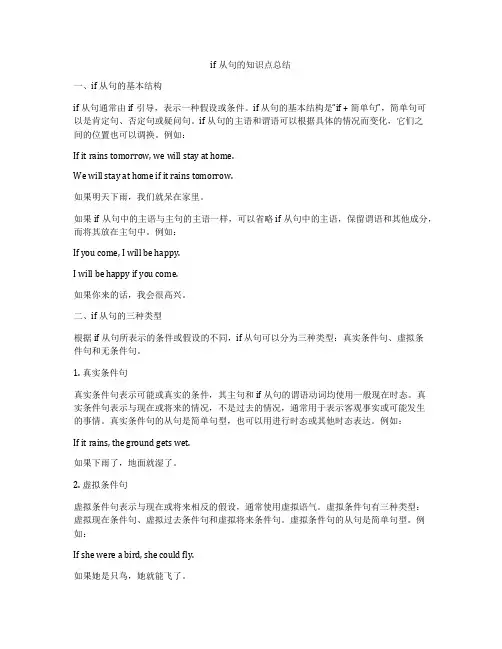
if从句的知识点总结一、if 从句的基本结构if 从句通常由if引导,表示一种假设或条件。
if 从句的基本结构是“if + 简单句”,简单句可以是肯定句、否定句或疑问句。
if 从句的主语和谓语可以根据具体的情况而变化,它们之间的位置也可以调换。
例如:If it rains tomorrow, we will stay at home.We will stay at home if it rains tomorrow.如果明天下雨,我们就呆在家里。
如果if 从句中的主语与主句的主语一样,可以省略if 从句中的主语,保留谓语和其他成分,而将其放在主句中。
例如:If you come, I will be happy.I will be happy if you come.如果你来的话,我会很高兴。
二、if 从句的三种类型根据if 从句所表示的条件或假设的不同,if 从句可以分为三种类型:真实条件句、虚拟条件句和无条件句。
1. 真实条件句真实条件句表示可能或真实的条件,其主句和if 从句的谓语动词均使用一般现在时态。
真实条件句表示与现在或将来的情况,不是过去的情况,通常用于表示客观事实或可能发生的事情。
真实条件句的从句是简单句型,也可以用进行时态或其他时态表达。
例如:If it rains, the ground gets wet.如果下雨了,地面就湿了。
2. 虚拟条件句虚拟条件句表示与现在或将来相反的假设,通常使用虚拟语气。
虚拟条件句有三种类型:虚拟现在条件句、虚拟过去条件句和虚拟将来条件句。
虚拟条件句的从句是简单句型。
例如:If she were a bird, she could fly.如果她是只鸟,她就能飞了。
3. 无条件句无条件句表示无条件的假设或条件,其实际情况一定会发生。
从句和主句的谓语动词可以使用一般现在时态、一般将来时态或其他时态。
例如:If you have finished your breakfast, go to school.如果你已经吃完早餐,就去上学吧。
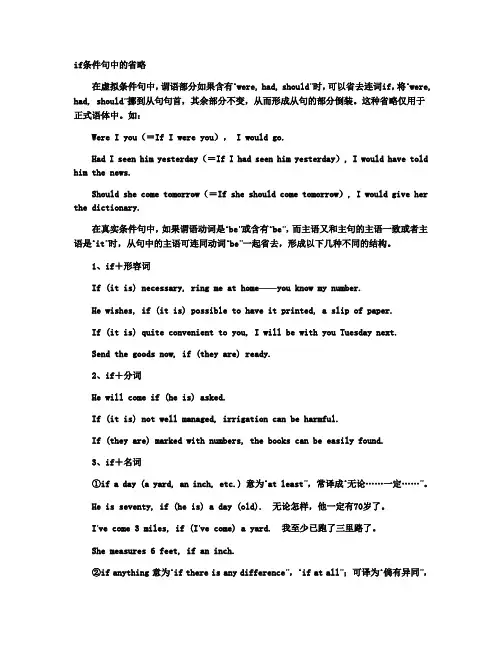
if条件句中的省略在虚拟条件句中,谓语部分如果含有“were, had, should”时,可以省去连词if,将“were, had, should”挪到从句句首,其余部分不变,从而形成从句的部分倒装。
这种省略仅用于正式语体中。
如:Were I you(=If I were you), I would go.Had I seen him yesterday(=If I had seen him yesterday), I would have told him the news.Should she come tomorrow(=If she should come tomorrow), I would give her the dictionary.在真实条件句中,如果谓语动词是“be”或含有“be”,而主语又和主句的主语一致或者主语是“it”时,从句中的主语可连同动词“be”一起省去,形成以下几种不同的结构。
1、if+形容词If (it is) necessary, ring me at home——you know my number.He wishes, if (it is) possible to have it printed, a slip of paper.If (it is) quite convenient to you, I will be with you Tuesday next.Send the goods now, if (they are) ready.2、if+分词He will come if (he is) asked.If (it is) not well managed, irrigation can be harmful.If (they are) marked with numbers, the books can be easily found.3、if+名词①if a day (a yard, an inch, etc.) 意为“at least”,常译成“无论……一定……”。
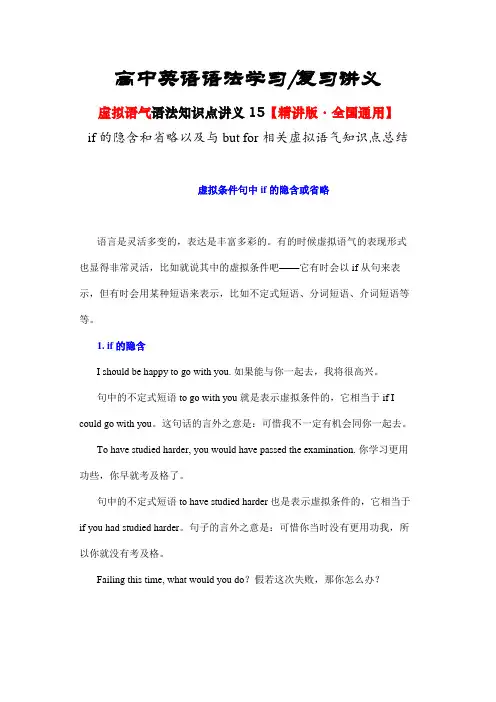
高中英语语法学习/复习讲义虚拟语气语法知识点讲义15【精讲版·全国通用】if的隐含和省略以及与but for相关虚拟语气知识点总结虚拟条件句中if的隐含或省略语言是灵活多变的,表达是丰富多彩的。
有的时候虚拟语气的表现形式也显得非常灵活,比如就说其中的虚拟条件吧——它有时会以if从句来表示,但有时会用某种短语来表示,比如不定式短语、分词短语、介词短语等等。
1. if 的隐含I should be happy to go with you. 如果能与你一起去,我将很高兴。
句中的不定式短语to go with you就是表示虚拟条件的,它相当于if I could go with you。
这句话的言外之意是:可惜我不一定有机会同你一起去。
To have studied harder, you would have passed the examination. 你学习更用功些,你早就考及格了。
句中的不定式短语to have studied harder也是表示虚拟条件的,它相当于if you had studied harder。
句子的言外之意是:可惜你当时没有更用功我,所以你就没有考及格。
Failing this time, what would you do?假若这次失败,那你怎么办?句中的分词短语failing this time表示虚拟条件,相当于if you failed this time。
其言外之意是:尽管失败的可能性很小,但还是有可能会失败,假若失败了,那怎么办?Without your help, we couldn’t have succeeded. 如果没有你的帮助,我们就不会取得成功。
句中的介词短语without your help表示虚拟条件,相当于if you hadn’t given us help。
其言外之意是:好在你帮助了我们,所以我们取得了成功。
I didn’t know that he was a cheat, or else I wouldn’t have believed him. 我不知道他是个骗子,不然我也不会相信他了。
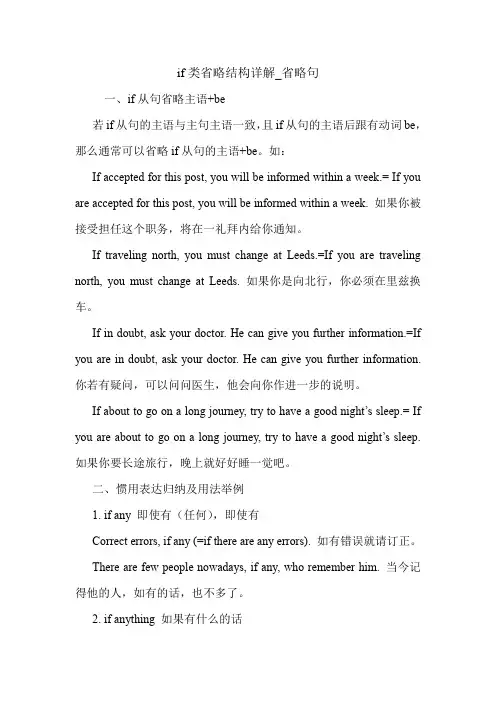
if类省略结构详解_省略句一、if从句省略主语+be若if从句的主语与主句主语一致,且if从句的主语后跟有动词be,那么通常可以省略if从句的主语+be。
如:If accepted for this post, you will be informed within a week.= If you are accepted for this post, you will be informed within a week. 如果你被接受担任这个职务,将在一礼拜内给你通知。
If traveling north, you must change at Leeds.=If you are traveling north, you must change at Leeds. 如果你是向北行,你必须在里兹换车。
If in doubt, ask your doctor. He can give you further information.=If you are in doubt, ask your doctor. He can give you further information. 你若有疑问,可以问问医生,他会向你作进一步的说明。
If about to go on a long journey, try to have a good night’s sleep.= If you are about to go on a long journey, try to have a good night’s sleep. 如果你要长途旅行,晚上就好好睡一觉吧。
二、惯用表达归纳及用法举例1. if any 即使有(任何),即使有Correct errors, if any (=if there are any errors). 如有错误就请订正。
There are few people nowadays, if any, who remember him. 当今记得他的人,如有的话,也不多了。
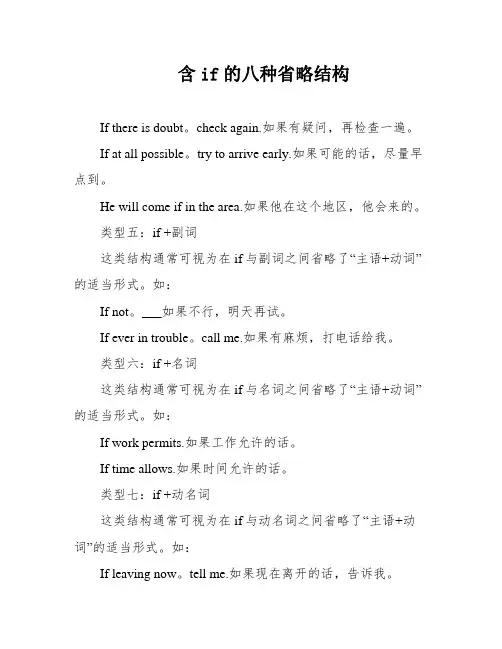
含if的八种省略结构If there is doubt。
check again.如果有疑问,再检查一遍。
If at all possible。
try to arrive early.如果可能的话,尽量早点到。
He will come if in the area.如果他在这个地区,他会来的。
类型五:if +副词这类结构通常可视为在if与副词之间省略了“主语+动词”的适当形式。
如:If not。
___如果不行,明天再试。
If ever in trouble。
call me.如果有麻烦,打电话给我。
类型六:if +名词这类结构通常可视为在if与名词之间省略了“主语+动词”的适当形式。
如:If work permits.如果工作允许的话。
If time allows.如果时间允许的话。
类型七:if +动名词这类结构通常可视为在if与动名词之间省略了“主语+动词”的适当形式。
如:If leaving now。
tell me.如果现在离开的话,告诉我。
If coming。
bring some food.如果来的话,带些食物。
类型八:if +从句这类结构通常可视为在if与从句之间省略了“主语+动词”的适当形式。
如:If you need help。
just ask.如果你需要帮助,随时问我。
If it rains。
we will stay inside.如果下雨了,我们就呆在室内。
___ very little。
if at all。
since the last ___(改写:自上次选举以来,他们的政策变化非常少,甚至可以说没有变化。
) If by any chance you are unable to have dinner tonight。
perhaps we ___(改写:如果今晚你碰巧不能吃晚饭,也许我们至少可以一起喝杯饮料。
)She seldom。
if ever。
goes to the cinema。
含if的八种省略结构类型一:if + 形容词这类结构通常可视为在if与形容词之间省略了“主语+动词be的适当形式”。
如:注:这类省略结构中有的已构成相对固定的搭配,if necessary (如果需要),if possible (如果可能)等.如:If necessary,ring me at home. 如果必要,可往我家里打电话。
If possible, let me know beforehand。
如果可能,可在事前通知我。
类型二:if + 过去分词其中的过去分词可视为是被省略的被动结构,即在if与形容词之间省略了主语和助动词be。
如:He will come if asked。
= He will come if he is asked. 他如被邀就会来。
The medicine is quite effective if taken in time.=The medicine is quite effective if it is taken in time。
这药要是能按时服用,效果是很好的。
类型三:if + 不定代词这类省略通常要根据具体的上下文来理解。
如:If anyone,he knows. 如果有人知道,那就是他了。
There are few people nowadays,if any,who remember him。
当今记得他的人,如有的话,也不多了.He seems to have little,if anything, to do with this。
若要说他和这事有什么相关的话,那也似乎是很少的。
类型四:if + 介词短语这类结构往往要根据具体的语境来理解,但有些经常搭配的惯用结构也值得注意,如if in doubt, if at all, if by any chance等。
如:If in doubt,ask your doctor。
He can give you further information.你若有疑问,可以问问医生。
虚拟语气虚拟语气用来表达说话人的愿望、请求、建议、假想等不能实现的情况。
1.虚拟语气用于条件句(1)if条件句与现在相反:If I had had a car, I would drive it to Beijing by myself.与将来相反:If I were to do it, I should do it at once.(2)省略if的条件句如果虚拟条件句中含有were\had\should时,if可以省略,这时从句要用倒装语序,把were\had\should移到主语前面。
如Had I known it, I wouldn’t had made such a silly mistake.注意:如果if引导的条件句谓语动词是否定形式,省略if,否定词not 不提前如:Were it not for rain, I would go shopping now.(3)含蓄条件句有是虚拟条件句不一定要用if条件句的形式表达,而是借助介词、介词短语等,常见形式有:without\thanks to\but for\or\otherwise等。
如:But for your help,I could not get home.2.虚拟语气用于名词性从句(1)主语从句It is important\require...+主语从句在这里表示建议,必要,命令等意思的结构中,要用should +动词原形,should可以省略。
这类形容词和分词有:advised\advisable\better\desired\demand\imperative\important\natural\neces sary\ordered\proposed\possible\required\recommended\suggested\urgent\str ange等。
如: It is important (that)we (should) finish the work.(2)宾语从句A: suggest,require,order...+宾语从句在一些表示建议、愿望、要求、请求、劝告、意志、欲望、命令、安排、决定等动词引导的宾语从句中,要用虚拟语气。
【1】if + everif ever 可视为习语,它通常与seldom连用,表示“极少”“难得”。
如:She seldom, if ever, goes to the cinema. 她难得看电影。
He seldom if ever travels abroad. 他到国外旅行,即使有过,也是极少的。
注:有时ever后面还修饰有其他词语。
如:The island is seldom if ever visited by ships. 这个岛难得有船停靠。
另外,它有时还可引出一个句子。
如:If ever you’re in Cambridge, do give me a ring.万一你来剑桥,一定要给我打电话。
【2】:if + notif not 可视为一个否定的条件状语从句省略。
如:I might see you tomorrow. If not, then it’ll be Saturday.我可能明天去看你。
如果不是明天,那就在周六。
Ask her if it is a convenient time. If not, can she suggest another possible time? 问问她那个时间方便不方便。
要是不方便,那她可不可以提出一个可行的时间?注:有时not还可修饰另一个词语。
如:If not today, tomorrow I’m sure you’ll get an answer.如果今天得不到回信,明天准能得到。
This is one of the oldest buildings in town, if not the oldest. 这是城里最古老的房屋之一,如果不是最古老的话。
Usually, if not always, we write “cannot” as one word.我们即使不总是如此,也通常是把cannot作为一个词来拼写的。
【3】if + soif so的意思是“如果是那样的话”。
if...类省略句结构用法_省略句if-型省略结构是一个非常有用的结构,本文拟对其可能涉及的结构作一全面归纳。
一、if + 形容词这类结构通常可视为在if与形容词之间省略了主语+动词be的适当形式。
如:Send the goods now if ready.= Send the goods now if they are ready. 货物如已备好,请即送来。
If true, this will cause us a lot of trouble.= If it is true, this will cause us a lot of trouble. 这事若是事实,它将给我们造成许多麻烦。
注:这类省略结构中有的已构成相对固定的搭配,if necessary (如果需要),if possible (如果可能)等。
如:If necessary, ring me at home. 如果必要,可往我家里打电话。
If possible, let me know beforehand. 如果可能,可在事前通知我。
二、if + 过去分词其中的过去分词可视为是被省略的被动结构,即在if与形容词之间省略了主语和助动词be。
如:He will come if asked.= He will come if he is asked. 他如被邀就会来。
The medicine is quite effective if taken in time.=The medicine is quite effective if it is taken in time. 这药要是能按时服用,效果是很好的。
三、if + 代词这类省略通常要根据具体的上下文来理解。
如:If anyone, he knows. 如果有人知道,那就是他了。
There are few people nowadays, if any, who remember him. 当今记得他的人,如有的话,也不多了。
if句型的用法总结2021-02-04if句型的用法总结以下是小编为大家整理的if句型的用法,希望能帮助大家更好地掌握if句型,提高英语水平。
if是英语中出现频率很高的连词,并且它的用法也很多。
学生感到很难掌握,为了让同学们更多更好地了解其用法及其语法功能。
现结合教学中遇到的.情况,予以归纳,以供参考。
一、if作为连词,引导条件状语从句,它表示的意思是“假如”“如果”等。
在复合句中如果主句用将来时,则if引导的状语从句用一般现在时。
例如:1. If itdoesn’train, we will go to the park next Sunday. 如果天不下雨,下周星期天我们将去公园。
2. If you ask him,he will help you.如果你求他,他将会帮助你。
二、if还可以引导让步状语从句。
这时if当作“即使是”,“虽说”解。
例如:1. If she’s poor,at least she’s honest. 虽说她很穷,但至少她还是诚实的。
2. I’ll do it, even if it takes me all the afternoon. 虽然会花费我一下午的时间,我还是要做这事。
3. If I am wrong,you are wrong, too. 即使说我错了,那么你也不对。
三、if引导时间状语从句,当if做“当”或“无论何时”解而不含有条件之义时,if从句中的时态与主句中的时态相同。
例如:1. If youmix yellow and blue,you get green.你将黄色与蓝色混合,便会得到绿色。
2. If she wants the servant,she rings the bell.每当她需要仆人时,她便按铃。
四、if作为连词还可以引导宾语从句。
引导宾语从句时和whether意思相同。
例如:1. Lily asked if / whether she liked it. 莉莉问她是否喜欢它。
省略 if 的虚拟条件句if 虚拟条件句的用法条件句主句与现在事If+ 主语主语实相反+were/v-ed ... +should(would/could/might)+do与过去事If+ 主语 +had 主语实相反done +should(would/could/might)+havedone与将来事If+ 主语 +were 主语实相反to / should +do +should(would/could/might)+do虚拟条件句的从句部分含有 were, should, 或 had 时, 可省略 if,再把 were, should 或 had 移到从句的句首,实行倒装。
例如:Were they here now, they could help us.=If they were here now, they could help us.他们现在在的话,就会帮助我们了。
Had you come earlier, you would have met him.=If you had come earlier, you would have met him.你来得早一点,就碰到他了。
Should it rain, the crops would be saved.=If it should rain, the crops would be saved.假如下雨,庄稼就有救了。
注意:在虚拟语气的从句中,动词 'be' 的过去时态一律用 "were" ,不用 was,即在从句中 be 用 were 代替。
例如:If I were you, I would go to look forhim.如果我是你,就会去找他。
If he were here, everything would be allright. 如果他在这儿,一切都会好的。
典型例题 _____ to do the work, I shoulddo it some other day.A. If were IB. I wereC. Were ID. Was I答案 C. 在虚拟条件状语中如果有were, should, had 这三个词,通常将 if 省略,主语提前 , 变成 were, should, had +主语的形式。
类型七:if + so
if so的意思是“如果是那样的话”。
如:
I may be free this evening. If so, I’ll come round and see you.今晚我可能有空。
要是有空我会过来看你。
They must decide if such a plan can be implemented and if so, when. 他必须决定这样的计划是否能实施,而且要是能实施的话,又得决定何时实施。
注意以下if so与if not连用的情形:
He may be busy. If so, I’ll call later. If not, can I see him now?他可能忙,如是这样,我以后再来拜访。
他如不忙,我现在可以见他吗?
Will you be staying another night? If so, we can give you a better room. If not, could you be out of your room by 12:00? 您要再往一晚吗? 如果是这样,我们可以给您提供条件更好一点的房间。
如果不是,您能在12点前离开这房间吗?
类型八:if need be如果需要
if need be为习语,其含义相当于if it is necessary (如果有必要的话)。
如:
I will come if need be. 如有必要我会来。
I’ll work at night if need be. 如果有必要我可以晚上工作。
If need be we can always bring another car. 如果有必要的话我们还可以再开一辆车来。